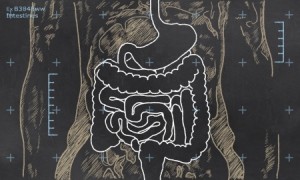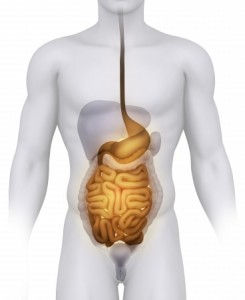How to Digest Better – Why Stomach Acid is Good for You
 If you take a walk down the isles of your local drug store, you will see a variety of medications to suppress stomach acid. The predominant message from the media and drug advertisements (like Prilosec or Zantac) is that stomach acid is bad for your health. In fact, these sources seem to indicate that stomach acid is so bad for you that we should all run out and take an acid suppressing medication, just to be safe. In this post I will explain why adequate stomach acid is not only essential, it is also critical in correcting a number of conditions including poor nutrient absorption, dysbiosis and acid reflux.
If you take a walk down the isles of your local drug store, you will see a variety of medications to suppress stomach acid. The predominant message from the media and drug advertisements (like Prilosec or Zantac) is that stomach acid is bad for your health. In fact, these sources seem to indicate that stomach acid is so bad for you that we should all run out and take an acid suppressing medication, just to be safe. In this post I will explain why adequate stomach acid is not only essential, it is also critical in correcting a number of conditions including poor nutrient absorption, dysbiosis and acid reflux.
Let’s start by explaining the main functions of stomach acid (HCL). First and foremost, stomach acid is used to break down proteins in the stomach (with the help of the enzyme pepsin), thus beginning the process of changing protein from food into the body’s preferred form: amino acids. This process of protein breakdown also involves enzymes such as pepsin and protease. After the contents of the stomach are released into the small intestine (SI), the presence of stomach acid triggers the cascade of other digestive chemicals including bile and pancreatic enzymes. If there is low stomach acid then there is often insufficient bile & digestive enzymes as well because HCL is a required chemical signal in the SI.
 Low stomach acid usually means proteins will not be broken down into amino acids properly, which leads to 4 major downstream problems:
Low stomach acid usually means proteins will not be broken down into amino acids properly, which leads to 4 major downstream problems:
- Proteins that cannot broken down into component amino acids are generally not useful in a nutritional sense. Undigested proteins therefore cannot be utilized for a myriad of essential functions including: repairing muscles, building healthy skin, creating immune cells, etc.
- Additionally, any undigested proteins that pass through the stomach and small intestine can be fermented by pathogenic (bad) bacteria causing symptoms like gas, bloating and inflammation.
- Any undigested proteins in the lower digestive tract have the potential to trigger immune reactions within the intestinal lining. Gluten is a primary example of this effect: because gluten is a protein that is very difficult to digest (even with there is sufficient stomach acid), the immune system in the lining of the intestines gets exposed to the undigested gluten protein. Over time, the immune system may start to flag gluten as an enemy that needs to be attacked and eliminated, creating a cycle of immune dysregulation and inflammation (thus food allergies or food intolerance forms).
- Lastly, many nutrients can only be properly absorbed in the digestive tract when in the presence of stomach acid. This means that low stomach acid may lead to nutrient depletion, especially: iron (ferritin), calcium, and B12.
In addition to protein digestion, stomach acid has another key responsibility: to kill any pathogens found in food including bacteria, fungi, and parasites. When stomach acid is sufficient the body is actually well-equipped to handle “dirty” food covered in bacteria and other pathogens. Considering how our ancestors ate, of course the digestive tract is hightly effective at killing bacteria and parasites in our food. When there is adequate stomach acid present a bit of bacteria from the roots of a dirty carrot or a few parasites found in raw fish will be easily neutralized when it hits the harsh acid environment of the stomach. If stomach acid is low then these pathogens may take-hold and become an infection in the intestines.
In a medical sense there are 2 major diagnoses here: hypochlorhydria (low stomach acid) and achlorhydria (lack of stomach acid). Achlorhydria and hypochlorhydria may not actually have any symptoms, but the most common symptoms are: feeling heavy after meals (especially after meals containing dense protein like red meat), fatigue after meals, gas, bloating, multiple food sensitivities, recurrent food poisoning, and acid reflux.
If you have one or more of the symptoms listed above and suspect low stomach acid then there are plenty of natural treatment options. Apple cider vinegar (ACV) and lemon juice are both acidic and support stomach acid. One teaspoon of apple cider vinegar mixed into water can be sipped with meals to help stimulate stomach acid production. Alternatively, lemon juice can mixed into a cup of hot water and taken with meals. If both ACV or lemon cause reflux-like symptoms then stomach acid is likely not deficient.
 We should also consider the most common causes of stomach acid deficiency are:
We should also consider the most common causes of stomach acid deficiency are:
- Chronic Stress – which lowers stomach acid while increasing stress hormones.
- Vegetarian diet – where the body will naturally need less stomach acid to digest vegetarian protein.
- Deficient salt (sodium) – stomach acid is hydrochloric acid, and the name “hydrochloric” indicates that it is made from a chloride ion. We get dietary chloride mainly from salt so people eating a low-salt diet may eventually produce less stomach acid.
- Advanced age – where stomach acid levels tend to naturally decline during the aging process.
Hopefully this article helps you better understand the role of stomach acid in the digestive tract. If you suspect that you have low stomach acid then start with some stress management and good quality sea salt. Experimenting with ACV and lemon water may provide some additional benefits. If these basic steps do not provide adequate relief from digestive symptoms then it may be time to meet with a healthcare professional to have a thorough evaluation and perhaps get some lab testing done.
Please don’t let the media fool you into believing that stomach acid should be eliminated for anyone with digestive complaints. In fact, many people with digestive complaints are stomach acid deficient! Stomach acid is so critical for our health and it generally declines as we age, meaning we should always take steps to cultivate and preserve our stomach acid.
